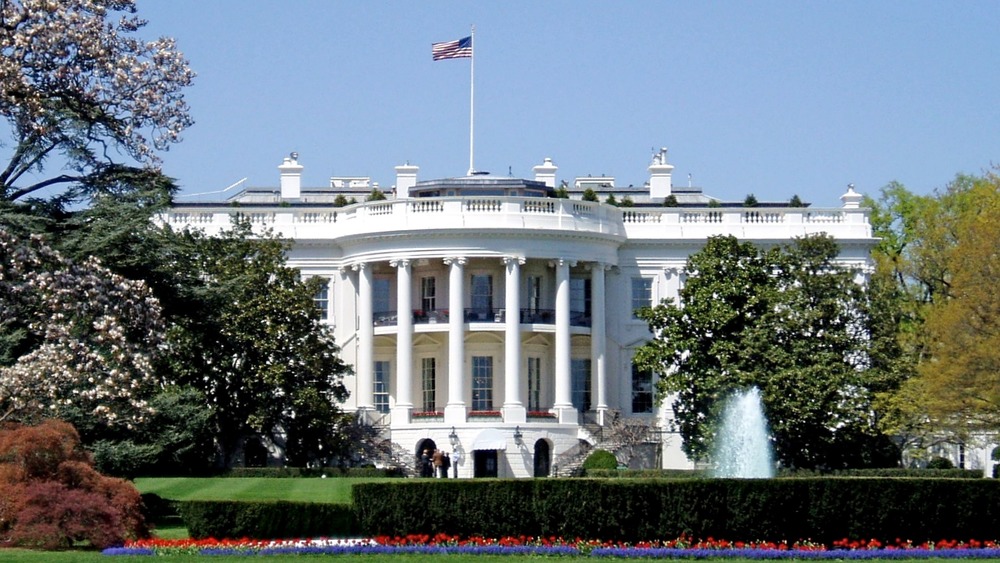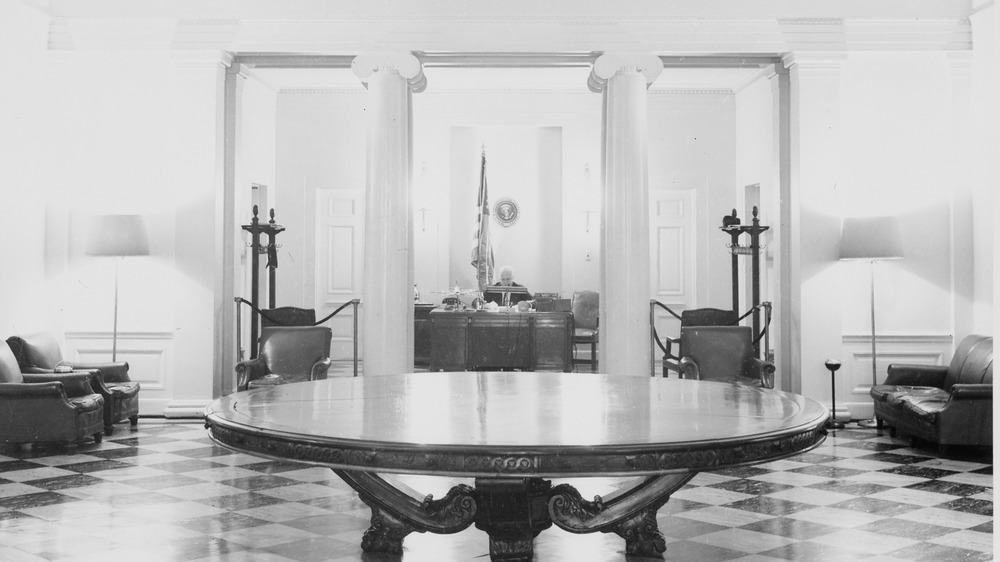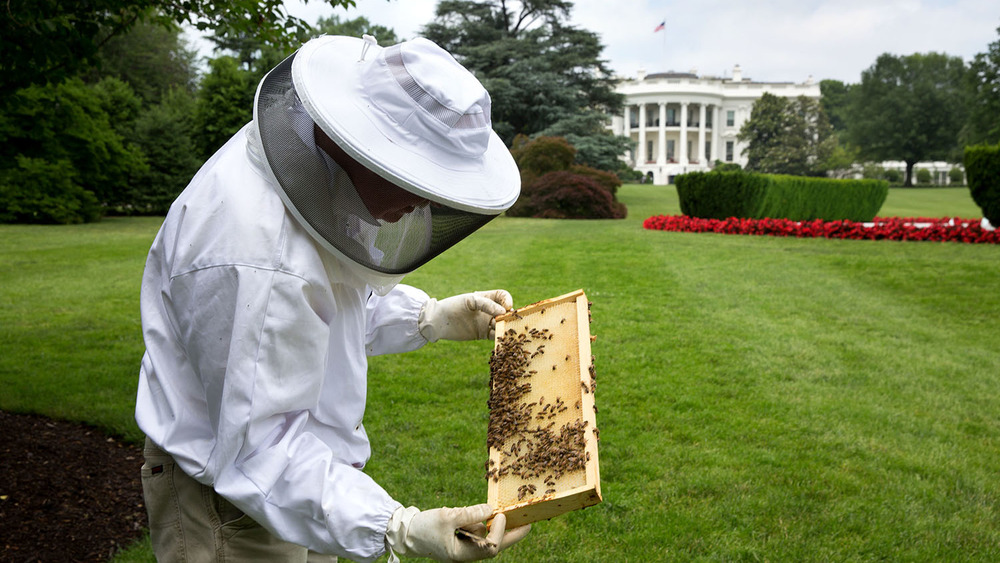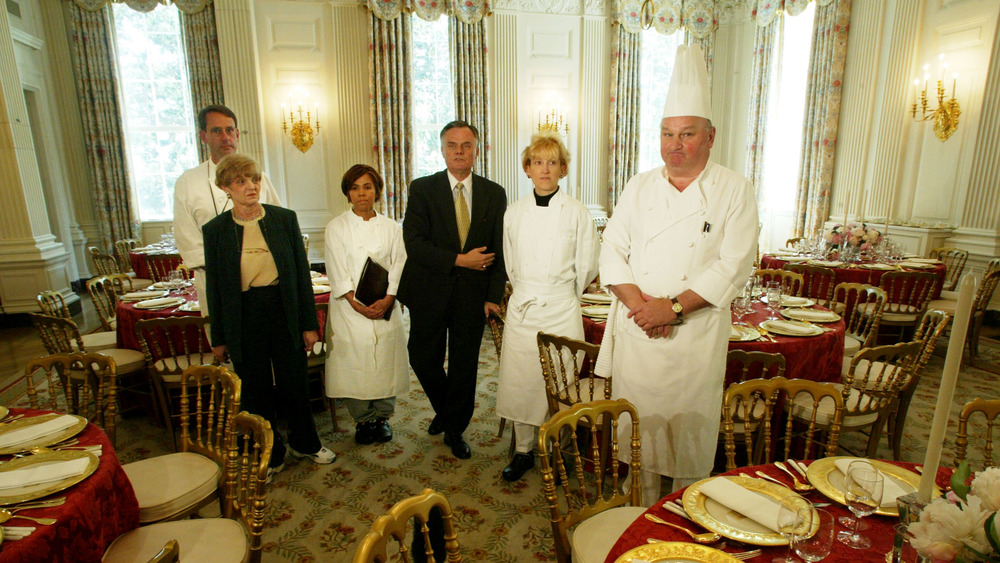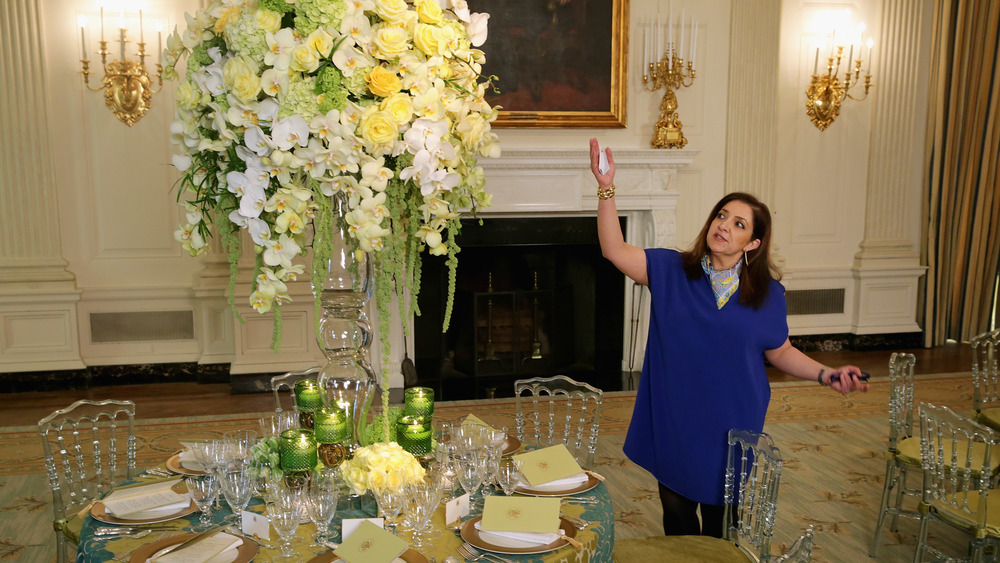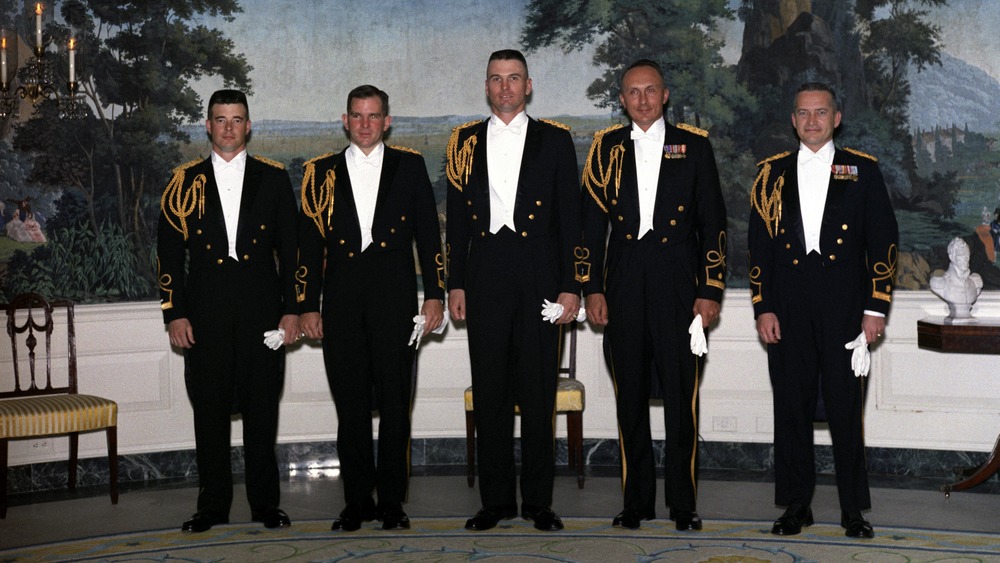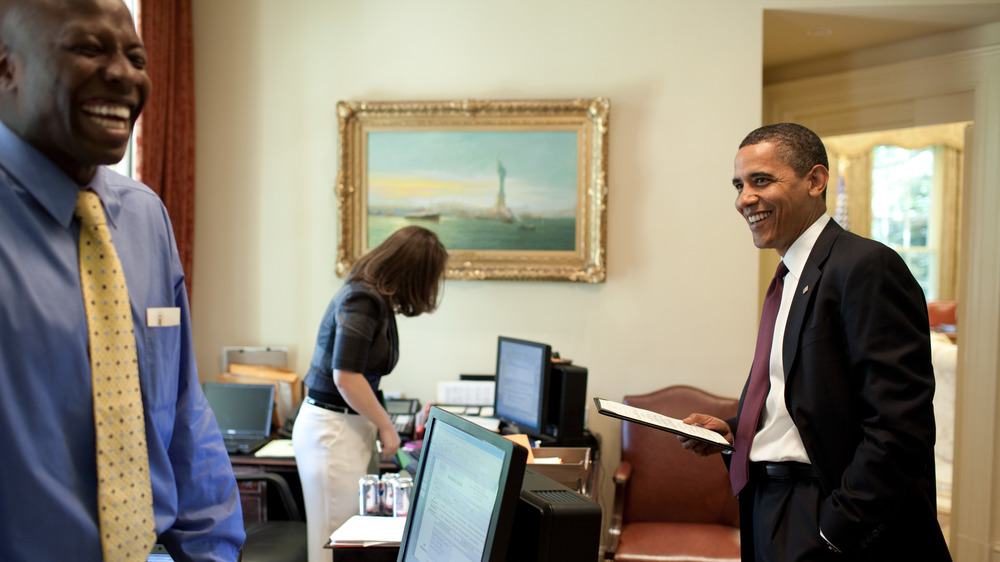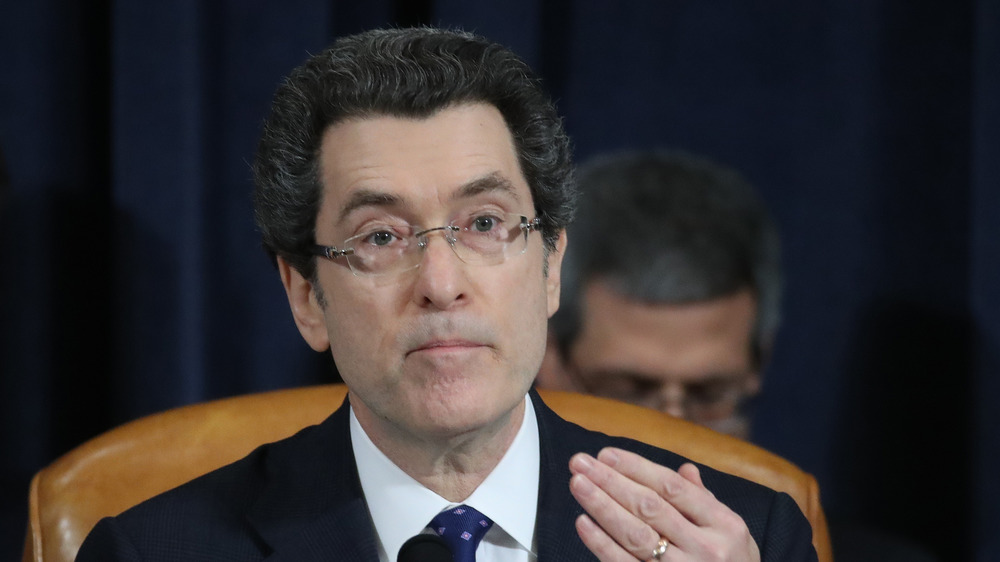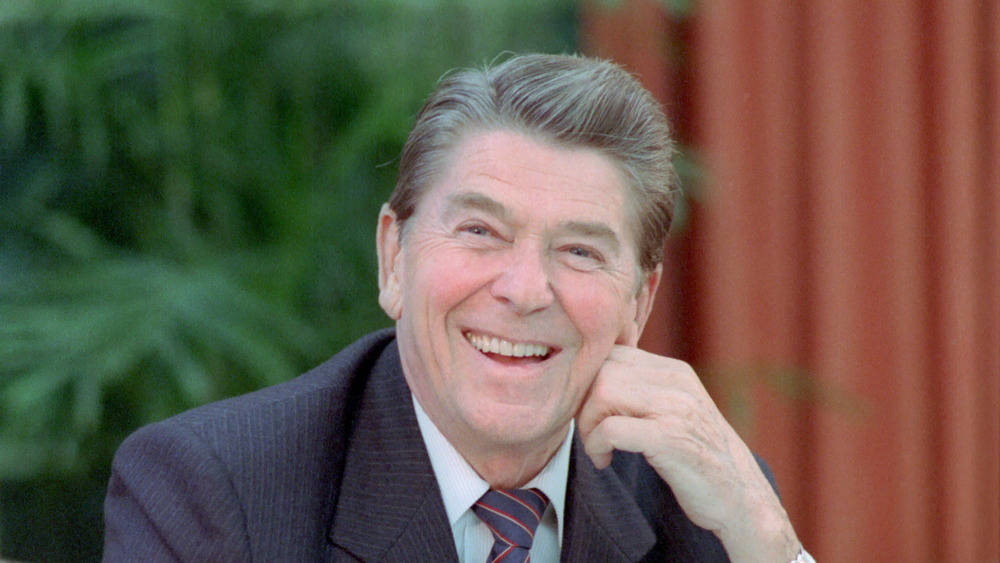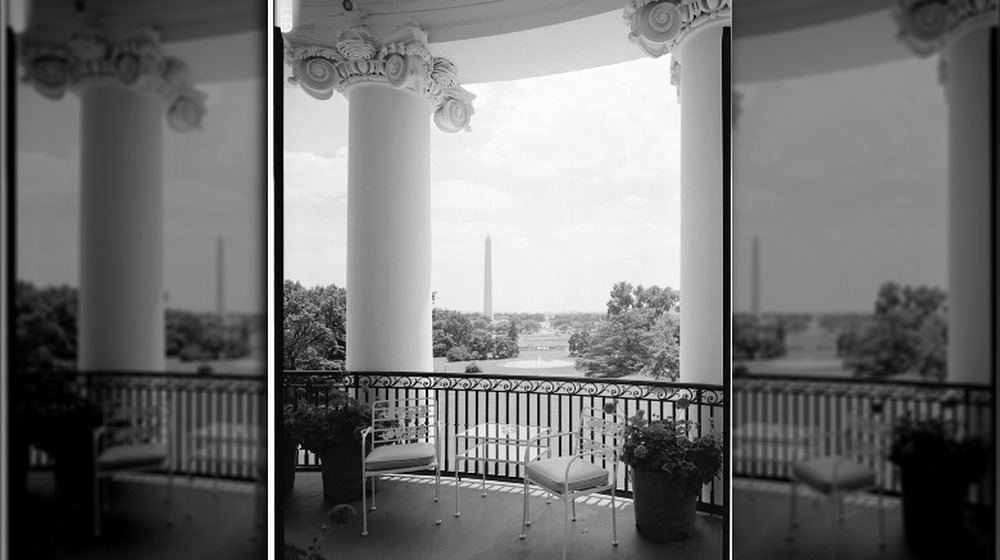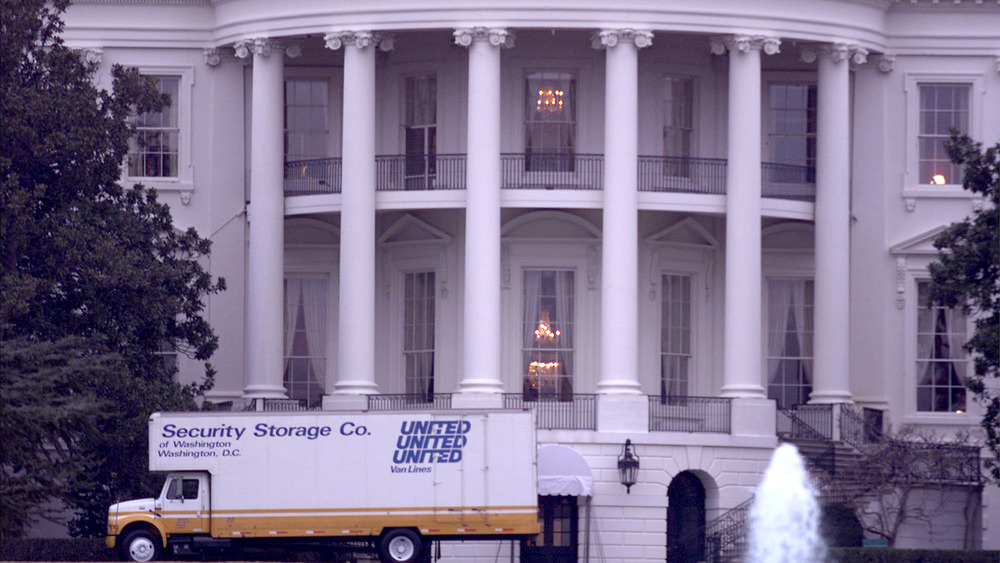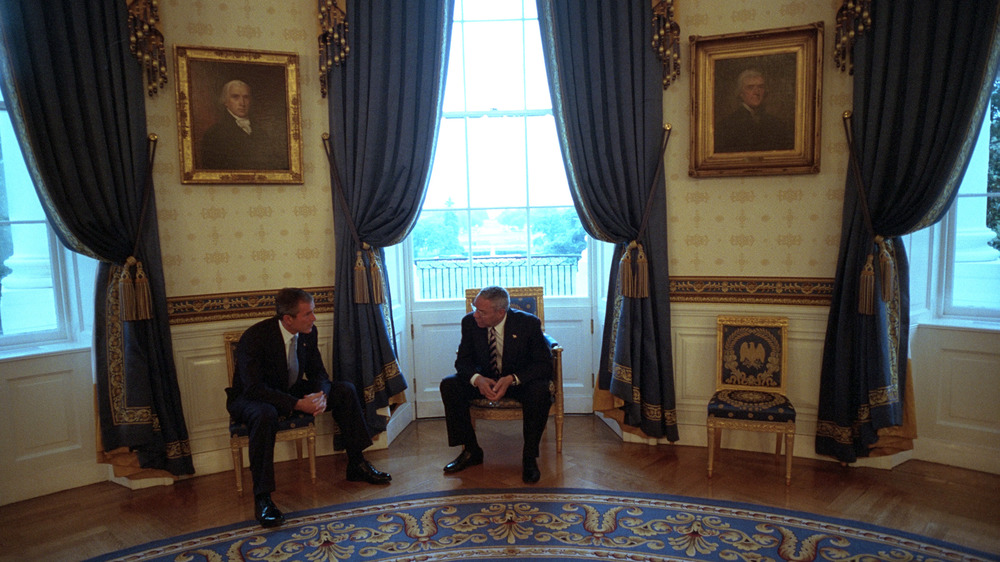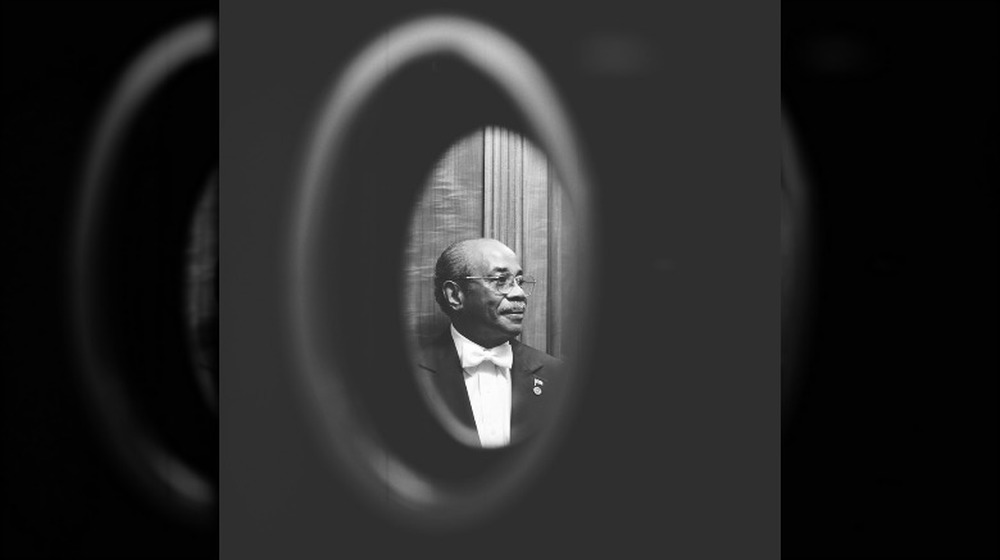Rules White House Staff Have To Follow
Much is made of what happens at the White House in Washington, D.C. That makes sense, since the job of president of the United States is a high-powered position that naturally comes with a lot of scrutiny. Administration staff, traditionally housed in the West Wing of the White House, also draw plenty of attention as they help reach the president's goals and campaign promises.
But, what about the residence staff at the White House? It's easy to forget that, amongst the hustle and bustle of the West Wing and the historic grandeur of the mansion at 1600 Pennsylvania Avenue, there remains a household that needs plenty of help to run. That means there are maids, gardeners, butlers, carpenters, florists, chefs, ushers, and many more people. PBS reports that this comes out to about 100 staff members dedicated to keeping the White House in tip-top shape.
They're vital to the functioning of the White House, says former first lady Laura Bush via Smithsonian Magazine. From choosing the right color floral arrangements for a state dinner to maintaining the correct humidity level in the historic residence, staff members are what keep the place together. To do so while also keeping the first family comfortable means that they have to follow rules that even a maid in an old-money mansion somewhere on the East Coast would find odd.
Staff openings at the White House are usually kept off the job boards
Does working at the White House sounds like a pretty plum job? You'll have to do some serious networking to snag a position there. You'll practically never see a job listing for even the most entry-level White House gig on a public board, no matter how much you use the search bar to your advantage. According to Mental Floss, open positions are more often filled through word of mouth. An existing employee might bring in a new hire, thereby vouching for them. This means that numerous generations of the same family might work at 1600 Pennsylvania Avenue, just through the sheer luck of having the right connections. Once they're in the mansion, it also takes a lot for many residence staff to leave. Employees are known to stick around for decades.
If you don't know someone who's already working in the White House, it might help to have an in with the next first family. In 2017, The New York Times reports, first lady Melania Trump nominated Timothy Harleth as chief usher, basically the chief of staff for the residence workers at the White House, including an estimated 90 other ushers. Previously, Harleth was director of rooms at the Trump International Hotel. Some commentators have wondered if this move, which passed over the tradition of politics-free ushers who stayed on for multiple administrations, heralded a new era where political factors influenced even the hiring of seemingly apolitical staff.
White House chefs have to take last minute orders and tend the bees
Food staff need to be able to change menus at the last minute, create elaborate table displays, and even tend the White House beehives. Yes, seriously, there are bees at the White House. Not actually inside the historic mansion, as CNN reveals, but definitely in its garden. The first hive was installed in 2009 at the behest of the White House executive chef. The bees help pollinate plants in the garden and bring more attention to issues facing honey bees, like parasites and habitat loss.
Executive chefs are also required to work long hours preparing for the many elaborate events that take place in the White House. During the Reagan administration, Reader's Digest reports, executive pastry chef Roland Mesnier went through a protracted dessert selection process with first lady Nancy Reagan.
Two days before an event, she decided upon an elaborate display of sugar baskets with sugar tulips in each one. When Mesnier told her that it would take many hours to make each basket in only two days, Reagan smiled and said, "Roland, you have two days and two nights before dinner." Mesnier got the work done, pleasing the first lady while presumably skipping a few hours of sleep in the interim.
White House workers have to read up on all the candidates
Anticipating the needs of the president and first family takes a lot of attention and effort. That sort of preparation can't happen overnight, however. Even a relatively mundane transferral of presidential administrations can mean a lot of upheaval and potential confusion.
To help everyone stay on track, Vanity Fair reports, the chief usher typically prepares a number of books for the people moving through the White House. At least a couple of these are reserved for the president and first lady and contain a staff list, rules for what they can change, and an exhaustively detailed map of the White House.
Residence staff also have access to their own briefing books on the incoming first family. Given how much preparation these books take, combined with the last-minute results of so many presidential elections, the chief usher reportedly makes multiple briefing books for an array of candidates and their families. It's possible that former chief usher Angella Reid assembled these collections that summarize a family's needs, likes, and dislikes for not only Donald Trump and company in 2016 but also Ted Cruz, Bernie Sanders, and a swath of other presidential hopefuls. Hopefully, the briefing book for Hillary Clinton was a little easier to make, given that her family had already inhabited the White House during her husband Bill Clinton's two terms from 1993 to 2001.
White House staff have to work seriously long hours
White House staff understand that they work in a pretty exceptional environment. Even if their job is to clean toilets or maintain the landscaping around the historic residence, the stakes are a little higher than average. The White House is the site for myriad photo opportunities, press conferences, and state visits. According to Reader's Digest, keeping everything in tip-top shape for these occasions and more often requires rising at dawn, working long hours, and sometimes staying up late to get things ready for big events.
Sometimes, at least, the weird hours can be kind of fun, as when President Richard Nixon invited kitchen staff member Frankie Blair to bowl with him. Nixon, who was an avid player, had a small bowling lane installed in the White House basement. The two played until the wee hours of the morning, with Nixon even writing a note to Blair's wife to apologize for keeping her husband up so late.
At least long-working staff members can expect to get paid. The White House Staff reports that the 2001 annual residence budget included an estimated 19 work-years' worth of overtime pay. One supervisor even told staff to expect unpredictability and odd hours, to the point where they shouldn't plan to celebrate every anniversary and birthday with their families.
Social aides are there to make White House guests feel comfortable
Though they aren't full time staffers, social aides are effectively White House temps. According to the White House Historical Association, social aides are U.S. military personnel who work events at the White House, attending to the needs of dignitaries and easing social interactions. They also move people along in the name of efficiency but with the sort of gentle social touch needed when the person being shuffled through the receiving line is a head of state or famous actor. The Washington Post further says that they must also be single, though today's social aides can be of any gender. They rank as high a major or lieutenant commander.
Hopefully, the social aides aren't in it for the money. As per an Associated Press report, taking on a gig as one doesn't garner any pay at all. In fact, the job often brings its extra expenses, like dry cleaning one's dress uniform and paying for transportation. Their duties might also include dancing, watching for the occasional pilferer, and respectfully loading extra-soused guests into a taxi.
But, as The Washington Post reports, being a social aide at the White House offers up some unique opportunities to mingle with high society. Aides have danced with Ginger Rogers, Goldie Hawn, and Princess Margaret. Female aides, who have been part of the program since 1969, have to be asked to dance, though apparently Cary Grant and Omar Sharif were happy to do so.
Some White House staff members are the president's official buddy
Being a president of the United States must be, at many times, a particularly chaotic and isolating experience. Some presidents have a "body man," or personal aide, that acts as a combination valet and friend. Presumably, that eases some of the pressure that comes with the job of being one of the most prominent Americans in the world.
For President Barack Obama, that part-valet, part-professional friend was Reggie Love, Politico reports. He first made an impression while working for then-Senator Obama in 2006. When Obama won election as the 44th president of the United States in 2008, Love was there as his "body man." He'd already earned Obama's trust, partially through numerous sessions on the basketball court (Love had played basketball at Duke University).
For much of his time in Washington, wherever Obama was, there was Love. He carried some of the president's most frequently needed items, from hand sanitizer, to energy bars, to the Nicorette gum Obama used to help quit smoking. If Obama was at the gym early in the morning, Love was there, too. If the president had to work late, yep, so did Love. Even today, long after he left for business school in 2011, Love says that he still carries a backpack of essentials because "you just never know."
One White House staff member must advise the president on ethics
Presidential administrations are generally pretty concerned about ethics, whether that's because of a genuine sense of responsibility or a desire to look good and avoid the appearance of any legal hanky panky. To that end, a few presidents have had whole teams of people to advise them on ethical matters. The Washington Post reports that, during the Obama administration, Norm Eisen worked as the president's ethics advisor. Being the top ethics guy seems to have meant that he was on-call at seemingly all hours, sometimes even to the point where he would have to return to the White House to advise Obama's team as soon as he had left it.
Eisen was so on top of his job advising pretty much everyone in the West Wing that White House counsel Gregory Craig called him "the original propeller-head ethics geek." Others called him "Mr. No" for his frequent response to ethics questions, especially whenever someone asked if they could bring a former lobbyist onto the White House team. Eisen eventually became notorious for his skepticism of lobbyists.
The White House is also supposed to get ethics guidance from lawyers, Congress, the Department of Justice, the Office of Government Ethics, and a few more federal entities. Who advises the president on what can get pretty tangled, NPR says, though only a few are supposed to have direct oversight over the president's ethics.
White House residence staff have learned to always knock
Though this hopefully doesn't happen all the time, residence staff during the Reagan administration learned that they really, really needed to knock before entering the president's private quarters. Otherwise, they might see, well, the president's private quarters, if you get the gist.
Reader's Digest reports that one maid, Ivaniz Silva, was employed as a member of the White House residence staff from 1985 to 2008. While turning down the bed in Reagan's room for the evening, she stepped into the adjacent sitting room. Silva was surprised to find Reagan there, reviewing some papers without a stitch on him. She rushed out, but Reagan, to his credit, later joked with her about the incident, presumably to show he had no hard feelings about the slip-up.
Silva wasn't the only staff member to get a more complete view of Reagan than they might have wanted. According to ABC News, usher Skip Allen was delivering some papers to the president in 1981. He found Reagan as he was getting out the shower without bothering to wrap a towel around himself. Later in the evening, Allen knocked on the Reagans' bedroom door to deliver yet another document. First lady Nancy Reagan let him in then fussed at her husband for walking around in his underwear in front of the staff. According to Allen, Reagan replied, "Oh, it's alright. He's already seen me naked once today. We're old friends."
Many White House staff have to work with serious security measures
Given the visibility of the White House, its status as a national symbol, and the controversies and stark opinions that often dog a president, it's no wonder that security is a top concern at the historic residence. Secret Service members are practically everywhere. Nearly everything that is moved into the White House is carefully screened. Yes, it's also true that the White House sometimes keeps a team of highly trained snipers on the roof of the mansion, according to ABC News. Even the maids and other residence staff are trained in security measures. You never know what might happen.
For one maid in 2011, careful observation and attention to security came to the forefront pretty quickly. According to The Residence, she noticed a broken window and a damaged bit of concrete on the Truman Balcony overlooking the south lawn of the White House. Knowing that she had to report anything strange, she went to the Secret Service with her find. They determined that someone had shot directly at the White House several days earlier.
Residence staff are the only ones who can move presidential families in or out of the White House
Working at the White House can bring all sorts of surprises, from hair-raising security concerns to scantily-clad presidents wandering about. It's also tough work, with plenty of overtime hours and high stakes as dignitaries visit and the president helps to lead the country.
Perhaps no task is quite as tough as the one that descends upon the residence staff every four to eight years — Inauguration Day. Whenever a new president, their family, and administration staff are set to move in, the residence team needs to start preparing. However, as much as they might develop a plan, staff can't actually do anything to move in a president until Inauguration Day itself. They cannot start until 10:31 a.m., Architectural Digest reports, after the outgoing and incoming presidents and their spouses have left for the inauguration ceremony.
While they're off conducting a peaceful transfer of power, the staff must move out the old president, clean an entire historic mansion, and move in the new president and their entourage, all by 3:30 p.m. New shampoo gets placed into the bathrooms, clothes are hung in the closets, fresh floral arrangements are set out, and even the correct size shoes are installed in the basement bowling alley. Oh, and because of security concerns, no professional movers are allowed inside the White House. According to The Residence, all of that work must be done solely by residence staff.
White House staff have to remember that they work in a museum
Though there is plenty of modern life that's made its way into the White House, staff and presidents alike must remember that they operate within a mansion that's well over 200 years old. Not only that, but the White House is such an entrenched piece of U.S. history and culture that it's considered a museum. No, not metaphorically. According to the John F. Kennedy Presidential Library, First lady Jackie Kennedy was instrumental in getting the White House officially declared a museum in 1961. As such, the residence not only has a first family and a massive staff but also an official White House curator. As the National Endowment for the Humanities reports, there's also a White House Historical Association that's there to help staff and residents balance the needs of a working presidential administration and the high curatorial standards in what's often called a "living museum."
All of this makes matters like simply moving a chair way more complicated than you might initially think. As per The Residence, some objects, like chairs in the historic Blue Room of the White House, are so old and historically important that they're managed and physically moved by curatorial staff, or at least by very experienced residence employees. No one wants to tell the curator that they broke an irreplaceable piece of American history, after all.
White House residence staffers have to deal with political suspicion
Historically speaking, most residence staff try to remain apolitical. They expect to work for multiple administrations over the course of many years, so it's pretty infrequent that you'll hear them speaking their political views out loud.
Try as they might, though, it appears that even the famously neutral White House residence staff have to deal with modern politics. New administration staff in the West Wing may cast a suspicious eye over long-serving staff, Vanity Fair says, as when chief usher Angella Reid was ousted soon after Donald Trump took office as the 45th president. To be fair, residence staff do serve at the pleasure of the president and can be let go without incurring any ethics violations.
While it's not clear if Reid's departure had anything to do with politics, other ushers' stories are a little more clear. The Washington Post reports that usher Chris Emery was fired in 1994 by then-first lady Hillary Clinton for taking multiple calls from former first lady Barbara Bush while he was in the White House. Emery said they were only speaking about Bush's memoirs and issues with her laptop, but a spokesman for Clinton said that it showed "an amazing lack of discretion" and had violated the first family's privacy.
